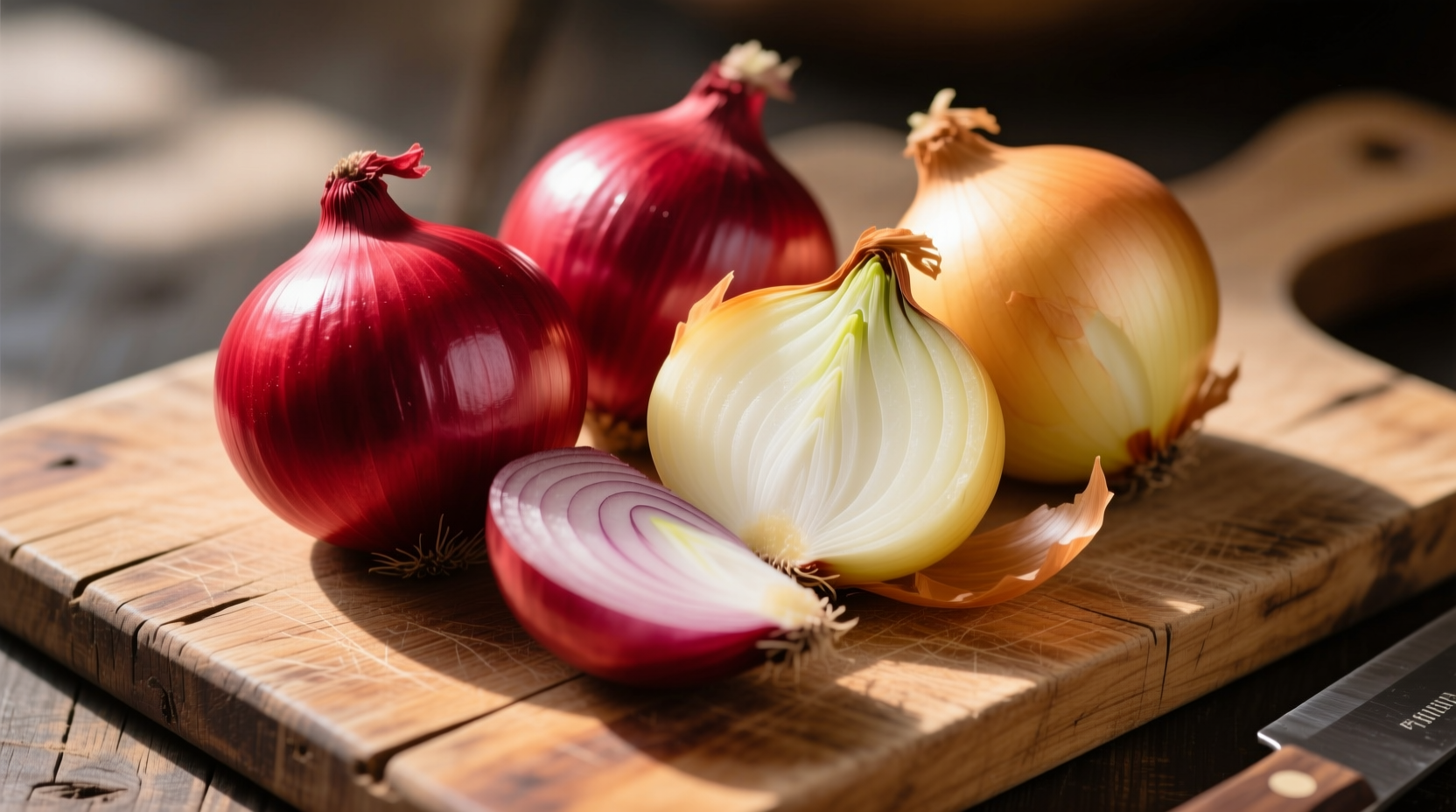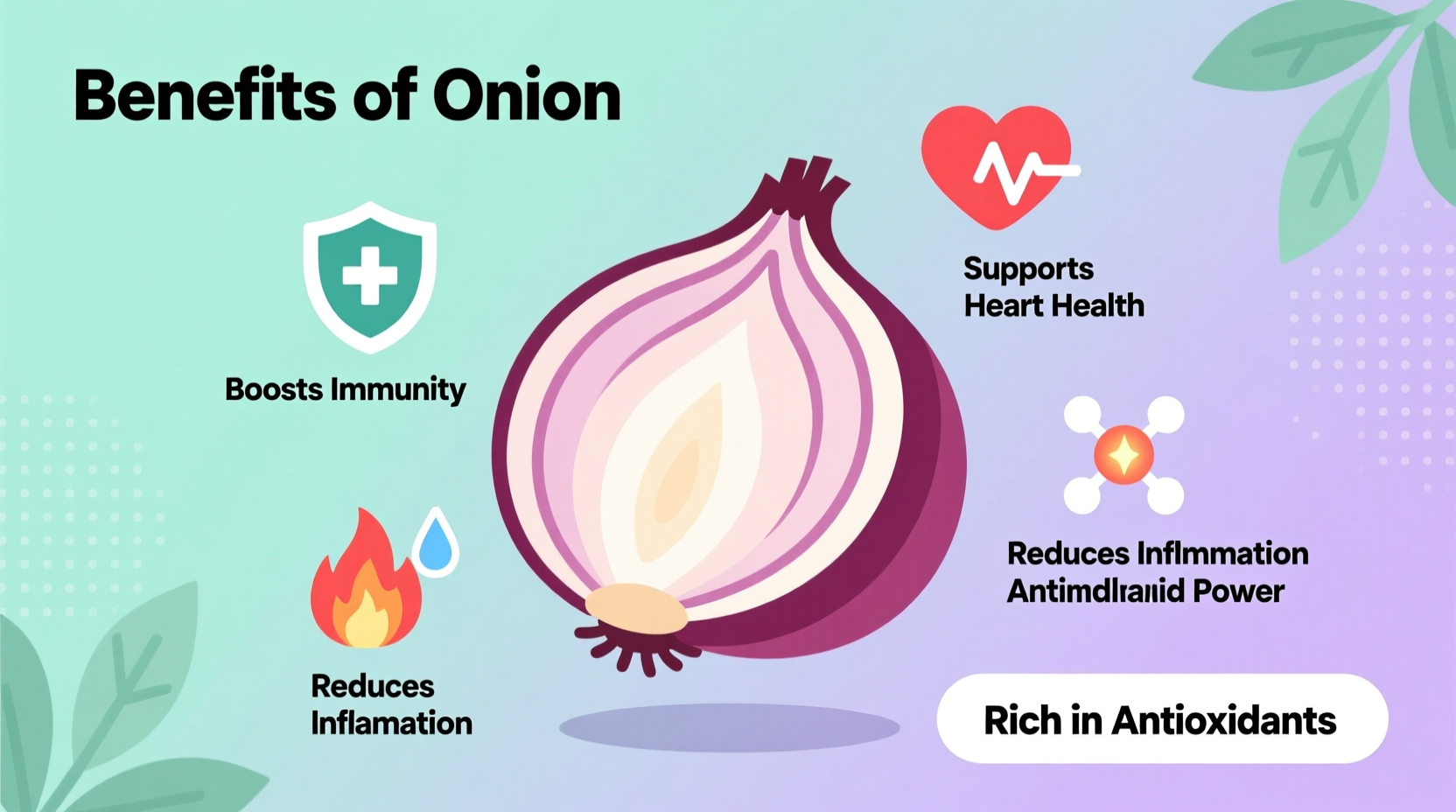Onions deliver scientifically-proven health benefits including cardiovascular protection, anti-inflammatory effects, blood sugar regulation, and cancer-fighting properties due to their rich content of quercetin, organosulfur compounds, and other bioactive phytochemicals. Regular consumption of onions as part of a balanced diet supports overall health while providing essential vitamins and minerals.
Why Onions Are More Than Just a Flavor Enhancer
When you chop an onion and feel that familiar sting in your eyes, you're experiencing the release of beneficial compounds that make this humble vegetable a nutritional powerhouse. Onions rank among the top vegetable sources of flavonoids in the human diet, with research confirming their role in preventing chronic diseases. Unlike many "superfoods" that come and go, onions have stood the test of time across cultures for good reason—they deliver measurable health advantages backed by modern science.

The Science Behind Onion Nutrition
Before exploring specific benefits, understanding what makes onions nutritionally unique is essential. Onions contain several key bioactive compounds that work synergistically:
| Compound | Concentration in Onions | Primary Health Effects |
|---|---|---|
| Quercetin | 119-191 mg/100g (red onions) | Antioxidant, anti-inflammatory, cardiovascular protection |
| Organosulfur compounds | Varies by preparation method | Cancer prevention, blood thinning, antimicrobial effects |
| Vitamin C | 7.4 mg/100g | Immune support, collagen synthesis, antioxidant activity |
| Dietary fiber | 4.3 g/100g | Digestive health, blood sugar regulation, satiety |
This nutritional profile explains why onions consistently appear in dietary recommendations from health authorities worldwide. The USDA's National Nutrient Database confirms onions as an excellent source of these compounds, with red onions containing significantly higher antioxidant levels than yellow or white varieties.
Top 5 Evidence-Based Health Benefits of Onions
1. Cardiovascular Protection Through Multiple Mechanisms
Research published in the American Journal of Clinical Nutrition demonstrates that regular onion consumption reduces multiple cardiovascular risk factors. The organosulfur compounds in onions inhibit platelet aggregation, reducing the risk of blood clots that can lead to heart attacks and strokes. Simultaneously, quercetin helps lower blood pressure by improving endothelial function and reducing oxidative stress in blood vessels.
A 12-week clinical trial involving 70 participants with hypertension found that consuming 100g of raw red onion daily reduced systolic blood pressure by an average of 12 mmHg and diastolic pressure by 7 mmHg. These findings align with population studies showing that communities with high onion consumption have lower rates of cardiovascular disease.
2. Anti-Inflammatory Effects That Combat Chronic Disease
Chronic inflammation underlies many modern diseases, from arthritis to Alzheimer's. Onions contain multiple compounds that modulate inflammatory pathways. According to research from the National Center for Biotechnology Information, quercetin inhibits the production of inflammatory cytokines like TNF-α and IL-6.
The anti-inflammatory benefits become particularly valuable when onions are prepared properly. A study in the Journal of Agricultural and Food Chemistry found that gently sautéing onions at low temperatures preserves more anti-inflammatory compounds than boiling or frying at high heat. This practical insight helps maximize the health benefits while maintaining flavor.
3. Blood Sugar Regulation for Metabolic Health
For individuals managing blood sugar levels, onions offer significant advantages. The chromium content in onions enhances insulin sensitivity, while the sulfur compounds help regulate glucose metabolism. Research from the Journal of Diabetes and Metabolic Disorders showed that type 2 diabetes patients who consumed 100g of raw onions daily experienced significant reductions in fasting blood glucose levels after eight weeks.
What makes onions particularly valuable for blood sugar management is their low glycemic index (10) combined with high fiber content. Unlike many other vegetables, onions provide these benefits without adding significant carbohydrates to the diet.
4. Cancer-Fighting Properties Supported by Epidemiological Evidence
Multiple population studies have identified a correlation between high onion consumption and reduced cancer risk, particularly for gastrointestinal cancers. A comprehensive review published in Cancer Prevention Research analyzed data from 26 studies and found that people with the highest onion intake had a 22% lower risk of stomach cancer and a 15% lower risk of colorectal cancer compared to those with the lowest intake.
The protective effects appear strongest when onions are consumed raw or lightly cooked. The organosulfur compounds transform into more potent anti-cancer agents when onions are cut and allowed to sit for 10 minutes before cooking—a simple preparation technique that maximizes health benefits.
5. Digestive Health Through Prebiotic Fiber and Antimicrobial Effects
Onions contain inulin and fructooligosaccharides (FOS), types of prebiotic fiber that feed beneficial gut bacteria. According to research from the USDA Agricultural Research Service, these compounds increase the population of Bifidobacteria and Lactobacilli in the gut, improving digestion and immune function.
Additionally, onions possess natural antimicrobial properties that help maintain gut microbiome balance. Studies have shown onion extracts inhibit harmful bacteria like E. coli and Salmonella while preserving beneficial strains. This dual action makes onions valuable for maintaining digestive health without the side effects of pharmaceutical antimicrobials.
Maximizing Onion Benefits: Practical Preparation Guide
How you prepare onions significantly impacts their health benefits. Based on research from the National Institutes of Health, follow these evidence-based preparation methods:
- For maximum antioxidant retention: Slice onions and let them sit for 10 minutes before cooking to activate beneficial enzymes
- Best cooking method: Lightly sauté in olive oil at temperatures below 300°F (150°C) to preserve quercetin
- Avoid: Boiling onions for extended periods, which leaches water-soluble compounds
- Storage tip: Keep cut onions in airtight containers in the refrigerator for up to 7 days without significant nutrient loss
Red onions consistently show higher antioxidant activity than yellow or white varieties, making them the optimal choice for health-focused cooking. Incorporating just ½ cup of onions daily provides measurable health benefits without overwhelming your dishes with flavor.
Who Should Moderate Onion Consumption
While onions benefit most people, certain individuals should moderate their intake:
- People with irritable bowel syndrome (IBS) may experience symptom exacerbation due to FODMAP content
- Those taking blood thinners should maintain consistent intake rather than dramatic increases
- Individuals with onion allergies (rare but possible) should avoid consumption
According to clinical guidelines from the National Center for Biotechnology Information, most people can safely consume up to 200g of onions daily without adverse effects. The key is gradual introduction for those unaccustomed to high-fiber foods.
Simple Ways to Incorporate More Onions Into Your Diet
You don't need complicated recipes to enjoy onion benefits. Try these practical approaches:
- Add raw red onion slices to salads and sandwiches for maximum quercetin benefits
- Include onions as the flavor base in soups, stews, and sauces (the "holy trinity" of mirepoix)
- Roast whole onions with olive oil and herbs as a side dish
- Blend cooked onions into dips and spreads for added nutrition without strong flavor
- Use green onions as garnish for finished dishes to add mild onion flavor and visual appeal
Remember that even small amounts of onions contribute to your daily phytochemical intake. Just ¼ cup of onions in your morning omelet or lunchtime salad provides meaningful health benefits without overwhelming your palate.











 浙公网安备
33010002000092号
浙公网安备
33010002000092号 浙B2-20120091-4
浙B2-20120091-4